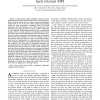Free Online Productivity Tools
i2Speak
i2Symbol
i2OCR
iTex2Img
iWeb2Print
iWeb2Shot
i2Type
iPdf2Split
iPdf2Merge
i2Bopomofo
i2Arabic
i2Style
i2Image
i2PDF
iLatex2Rtf
Sci2ools
125
click to vote
CLUSTER
2003
IEEE
2003
IEEE
Coordinated Checkpoint versus Message Log for Fault Tolerant MPI
— Large Clusters, high availability clusters and Grid deployments often suffer from network, node or operating system faults and thus require the use of fault tolerant programming models. MPI is one of the most widely adopted programming models for high performance computing. There are several approaches for fault tolerance in an MPI environment. The automatic and transparent ones are based on either coordinated or uncoordinated checkpointing associated with a message log strategy. There are many protocols and optimizations for these approaches and several implementations have been made. However, few results of comparison between them exist. Coordinated checkpoint has the advantage of a very low overhead as long as the execution stays fault free. In contrary, uncoordinated checkpoint must be complemented by a message log protocol which adds a significant penalty for all message transfers even for fault free executions. The drawbacks of coordinated checkpoint are the synchronization ...
CLUSTER 2003 | Cluster Computing | Fault Tolerant Programming | Message Log | Uncoordinated Checkpoint |
Related Content
| Added | 04 Jul 2010 |
| Updated | 04 Jul 2010 |
| Type | Conference |
| Year | 2003 |
| Where | CLUSTER |
| Authors | Aurelien Bouteiller, Pierre Lemarinier, Géraud Krawezik, Franck Cappello |
Comments (0)

